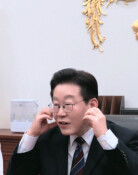Regulation Hindering Technological Advances
Regulation Hindering Technological Advances
Posted March. 27, 2010 06:51,
LG Electronics developed in 2004 a mobile phone able to measure blood sugar level and manage medication administration. The company had to give up commercializing the product, however, due to the burden of getting government approval since the new mobile phone was categorized as a medical device under medical law. A large corporation pursued online medical services but gave up the new project due to excessive regulations. A transportation equipment company developed a forklift truck that functioned as a forklift as well as a truck, but government approval was delayed more than four months due to lack of standards. This caused losses of more than six billion won (5.3 million U.S. dollars) for the company.
More companies are developing new products that incorporate technologies in different fields, such as smartphones, virtual golf and online medical services. Lack of laws and standards, however, is an obstacle for such products being put on the market. Certain companies that are developing such products are giving up development. A survey of 1,346 domestic companies conducted by the Korea Chamber of Commerce and Industry found that 41 percent who developed technologically convergent products saw the commercialization delayed. A fourth of the companies surveyed said government approval of their products were delayed or rejected due to lack of standards. And 91.5 percent of companies mentioned the necessity of separate laws to promote the development of convergence products and industries.
Technology and industry convergence is essential to the creation of growth engines. If industries Korea has a competitive edge in such as shipbuilding, steel, cars and semiconductors are combined with the IT and biotechnology industries, all industries can grow together. IT accounts for more than 20 percent of automotive technology. So to develop the auto industry, the incorporation of IT is a must. Deloitte Consulting says the world convergence market will rapidly grow in value to 20 trillion dollars in 2013.
Companies have difficulty developing convergence products since the Korean government provides support only by industry. Though industry convergence among new fields such as IT, biotechnology and nanotechnology, overlapping functions of regulatory bodies hinder the swift drafting of new regulations and standards. A case in point is the delay of Internet TV commercialization under the previous Roh Moo-hyun administration.
In 2002, the U.S. began promoting convergence technologies to enhance human performance capabilities. In 2004, Europe drew up a convergence technology policy for a knowledge society and Japan established a strategy to create new industries. The Korean government should also enact laws to facilitate industry convergence by eliminating blind spots between laws and enacting new laws. Government agencies should also adjust their systems and attitudes to fall in line with global trends in technology convergence.





![[단독]폴란드, 韓 해군 최초 잠수함 ‘장보고함’ 무상 양도 안받기로](https://dimg.donga.com/c/138/175/90/1/wps/NEWS/IMAGE/2026/02/27/133437397.1.jpg)

